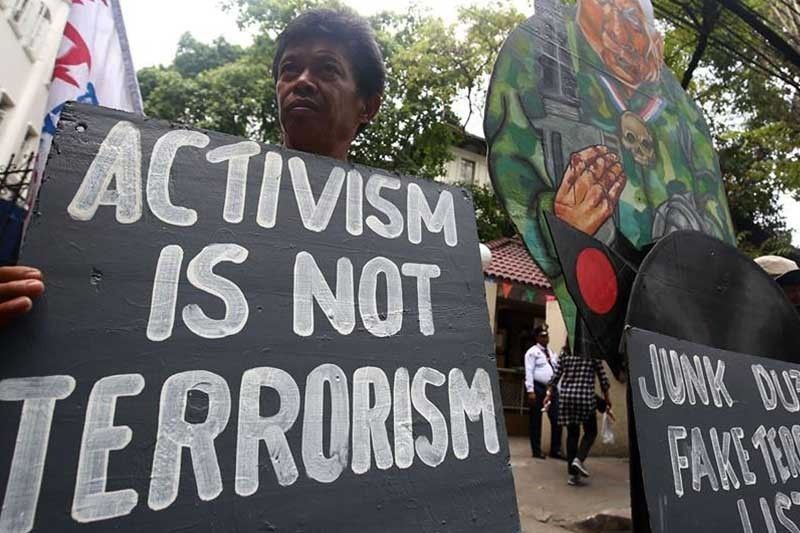Duterte urges House to fast-track passage of 'Anti-Terror Bill'

MANILA, Philippines — President Rodrigo Duterte has certified the proposed Anti-Terror Bill urgent, which would fast-track its passage through the House of Representatives, where the administration enjoys an overwhelming majority.
In a letter to House Speaker Alan Peter Cayetano, Duterte said immediate enactment of the bill is necessary "to address the urgent need to strengthen the law on anti-terrorism in order to adequately and effectively contain the menace of terrorist acts for the preservation of national security and the promotion of general welfare."
Bills certified as urgent can be passed on second and third reading on the same day.
Rights groups have warned that the bill's enactment would make the human rights situation in the Philippines worse.
As the country is preoccupied with combating the spread of the new coronavirus, House committees on public order and safety, and defense and security last week approved a bill seen to toughen up the nation’s anti-terrorism policies. The panels adopted the Senate version of the bill, which seeks to repeal the Human Security Act of 2007.
In a statement Monday, the International Coalition of Human Rights in the Philippines said it is appalled that the government is “giving priority to repressive legislation but remains bungling in addressing the pandemic.”
Senate Bill 1083, approved on third and final reading last February, authorizes police and military personnel to detain persons suspected of committing terrorist acts without charges for a maximum of 24 days.
The proposed measure also gives the Anti-Terrorism Council the power to “designate” individuals and groups as terrorists. Under the current law, this determination is done by a court.
The government filed a petition in February 2018 to declare the Communist Party of the Philippines and New People's Army as terrorist organizations. The original petition included hundreds of names of alleged communist terrorists, including a UN special rapporteur and human rights workers.
READ: UN rapporteur, 3 others cleared from DOJ terror list
The bill also penalizes the crime of “inciting to terrorism,” which rights advocates said is similar to the crimes of inciting to sedition and inciting to rebellion in the Revised Penal Code.
Defense Secretary Delfin Lorenzana said the tougher legislation would strengthen the government’s response against terrorism.
RELATED: DOJ OKs inciting to sedition charge vs teacher who offered bounty for Duterte's slay | Prosecution: Warrantless arrest of teacher 'defective,' but confession to media 'cured' it
“This law will not in any way protect civilians from acts of terrorism, instead, it will only intensify the already deplorable human rights situation under the Duterte government,” said Peter Murphy, ICHRP chairperson.
“The terror bill erodes the freedoms and liberties of Filipinos which are inalienable, guaranteed by their Constitution and the Universal Declaration of Human Rights and other internationally agreed-upon instruments to which the Philippines is a signatory,” he added.
Human rights groups and critics of the anti-terror law also warned that it could be used against dissenters and members of the opposition because of the broadness and vagueness of definition of terrorism.
The government has increasingly red-tagged progressive groups and even rights organizations as legal fronts of the communist rebels.
“We have seen the political killings, heard the accounts of survivors and family members, and felt the growing discontent of Filipinos. It is the activists and citizens like Badion who are the true targets of the terror bill,” Murphy said, referring to the killing of urban poor leader Carlito Badion last week.
He had reportedly been red-tagged — accused of being a communist rebel — and received death threats before he was killed.
‘Last piece of puzzle to martial law’
Rights watchdogs also stressed that the proposed legislation would provide a pretext for de facto martial law in the country.
“The Philippines has the longest and most militarized response to COVID-19 in the world. This terror bill, if signed into law, is a rubber stamp to already undeclared military rule and will only legalize the targeting of critics and civilians,” Murphy said.
Local rights group Karapatan, for its part, said the proposed measure would only embolden state security forces to commit more human rights violations “with more impunity.”
“We have already seen what happens when state security forces are given more power. Ordinary citizens criticizing the president and his anti-people policies have been served subpoenas or have been put under surveillance, harassed and arrested, even for satirical posts,” Roneo Clamor, Karapatan deputy secretary general, said Saturday.
Related video:
- Latest
- Trending



































